- Home
- John Harris
Fox from His Lair
Fox from His Lair Read online
Copyright & Information
The Fox From His Lair
First published in 1978
Copyright: Juliet Harris; House of Stratus 1978-2011
All rights reserved. No part of this publication may be reproduced, stored in a retrieval system, or transmitted, in any form, or by any means (electronic, mechanical, photocopying, recording, or otherwise), without the prior permission of the publisher. Any person who does any unauthorised act in relation to this publication may be liable to criminal prosecution and civil claims for damages.
The right of John Harris to be identified as the author of this work has been asserted.
This edition published in 2011 by House of Stratus, an imprint of
Stratus Books Ltd., Lisandra House, Fore Street, Looe,
Cornwall, PL13 1AD, UK.
Typeset by House of Stratus.
A catalogue record for this book is available from the British Library and the Library of Congress.
EAN ISBN Edition
0755102304 9780755102303 Print
0755127412 9780755127412 Mobi/Kindle
0755127692 9780755127696 Epub
This is a fictional work and all characters are drawn from the author’s imagination.
Any resemblance or similarities to persons either living or dead are entirely coincidental.
www.houseofstratus.com
About the Author
John Harris, wrote under his own name and also the pen names of Mark Hebden and Max Hennessy.
He was born in 1916 and educated at Rotherham Grammar School before becoming a journalist on the staff of the local paper. A short period freelancing preceded World War II, during which he served as a corporal attached to the South African Air Force. Moving to the Sheffield Telegraph after the war, he also became known as an accomplished writer and cartoonist. Other ‘part time’ careers followed.
He started writing novels in 1951 and in 1953 had considerable success when his best-selling The Sea Shall Not Have Them was filmed. He went on to write many more war and modern adventure novels under his own name, and also some authoritative non-fiction, such as Dunkirk. Using the name Max Hennessy, he wrote some very accomplished historical fiction and as Mark Hebden, the ‘Chief Inspector’ Pel novels which feature a quirky Burgundian policeman.
Harris was a sailor, an airman, a journalist, a travel courier, a cartoonist and a history teacher, who also managed to squeeze in over eighty books. A master of war and crime fiction, his enduring novels are versatile and entertaining.
A Song
…For the sound of his horn brought me from my bed
And the cry of his hounds which he oft-times led,
For Peel’s ‘View Halloo’ would awaken the dead
Or the fox from his lair in the morning.
Yes, I ken John Peel, and Ruby too,
Ranter and Ringwood, Bellman and True;
From a find to a check, from a check to a view,
From a view, to a death in the morning…
‘John Peel’
Old English hunting song
Author’s Note
The Allied invasion of Europe on D-Day, 6 June, 1944, was plagued in the planning stages by a number of mishaps which came very close to causing its postponement. Papers were mislaid or misdirected; men, caught by excitement and enthusiasm, talked too much; even the crosswords in the Daily Telegraph put Security on the alert by using among their clues and answers code names which had been set aside and guarded with the closest secrecy.
The night action off Slapton at the western extremity of Lyme Bay at the end of April provided one of the biggest of all the scares. Ten officers, all of them well briefed as to the plans for the invasion and for the events of the following weeks, were found to be missing, and it was with the greatest alarm that the Allied chiefs viewed the possibility of their having been picked up by the Germans. This disaster was one of the most closely kept secrets of the war – little of it leaked out even to Torquay and the coastal villages round Lyme Bay – and few people know what it led to in the following weeks and its climax on the D-Day beaches.
Little has ever been written about the affair of the Fox and most of it recently came to light in the papers of the late Colonel Linus C Iremonger, of Providence, Rhode Island, USA, on which this novel has been largely based. Colonel Iremonger was the man most heavily involved in the affair but he never spoke about it. He had obviously intended at one time to write a book about it himself as his papers were detailed and frank in the extreme, even to his opinions on the people he worked with. These details have since been confirmed – and embellished – by his old friend, Colonel Cuthbert William Randall Pargeter, of Milton Abbas, Dorset, England, who as a young officer became Iremonger’s deputy in the weeks preceding the invasion.
Colonel Iremonger remained a bachelor without as far as can be ascertained any close relatives. Because of his lifelong taciturnity, further details have had to be sought elsewhere. For information on the virtually unknown disaster in Lyme Bay I am indebted to Mr D B Nash, of the Imperial War Museum’s Department of Printed Books; Samuel Eliot Morison’s The Invasion of France and Germany 1944–5; and General Omar Bradley’s A Soldier’s Story. The information on Ultra was obtained from The Ultra Secret, by F W Winterbotham. For obvious reasons certain names have been changed and the shadowy figure of Colonel Ebert Klaus Reinecke cannot be filled in completely. Inevitably, little was uncovered about him beyond what Colonel Iremonger’s team dug up or reconstructed, and in the holocaust that descended on Germany in 1945 any German papers there might have been referring to him vanished completely.
Part One
From a Find to a Check
One
As the destroyer drove westwards across the waters of Lyme Bay, the two officers standing by the Carley float lashed to the side of the bridge huddled deeper into the high collars of their khaki coats against the wind that bit sharply at their flesh. As they searched the misty coastline, the ship bucked, taking the tip off a wave, and a slash of spray lifted across the deck, blurring their night glasses and the view of a landing ship packed with infantrymen just visible to starboard, pitching in the heaving sea.
Ashore, a cluster of cottages on a narrow strip of land marked the village of Slapton Sands. Obscured by darkness, it was silent and empty of villagers because the inhabitants had been moved away to enable the troops training for the great invasion of Europe, that everyone knew was coming before long, to practise on a beach as much as possible like the ones they were to attack in France. Nobody liked the added realism of live shells and bullets or their effect on property – least of all the villagers – but in a country which in April, 1944, was bulging at the seams with troops, it had been accepted that if the invasion on which the future of the world depended were to succeed, then sacrifices had to be made.
Indeed, the whole south coast of England had become one vast armed camp, packed with men, all speculating on the date and destination of the assault, and worrying whether, when it came, they would be killed. Perhaps the only things they didn’t know at this late stage of their training were these very facts, and security was so strict that a few days before, at the beginning of the month, a strip of coastline from the Wash to Land’s End had been restricted so that no one, neither civilian nor soldier, could move in or out without a high priority pass.
One of the two officers, wearing the single star of an American brigadier-general, peered at a sheet of paper in his hand. ‘“Slapton,”’ he read. ‘“Unspoiled beach of coarse red gravel, fronting a shallow lagoon and backed by grassy bluffs. Nearby village evacuated.”’ He looked up and stared towards the shore. ‘I guess it’s not so goddam unspoiled now, Linus,’ he said. ‘Not after the first wave hit it yesterday.�
�
Colonel Linus Iremonger, the second officer, turned. ‘How’d it go, sir?’
‘Okay.’ Brigadier-General George Orme shrugged. ‘The air force was late and everybody was scared in case they hit the infantry as they went in. But it went okay on the whole, I suppose. It’s easier tonight. All the back-up wave has to do is go in and unload as if it was the real thing.’
He stared at the shore. ‘I guess we don’t appreciate what the British are putting up with, with these rehearsals,’ he observed. ‘Now that the blitzes have stopped, the poor bastards have got us.’
Iremonger grunted. Certainly, the Luftwaffe had been driven from the sky in this part of the English Channel and even he was aware of the sense of relief the British felt after enduring the bombing ever since 1940. Now the Luftwaffe was restricted only to desperate snap reconnaissances to discover the route of the invasion and, though recce planes were said to be still getting in over the Thames estuary, west of Dover nothing was ever allowed to approach the build-up of shipping in daylight. When they came at night, the barrage threw up such a weight of steel they were forced inland, to drop their bombs on coastal towns in raids that were mere fleabites compared with the blitzes of 1940 and 1941. There was little talk nowadays about bombing – as though the British preferred to put it from their minds – and, like Orme, Iremonger knew that the growing number of American troops – with their demands on transport, space and the younger female population was taking its place with them as Number One Problem. Not unnaturally, the Americans resented it because they considered they had arrived to save the British from defeat and expected their due toll of admiration, gratitude and tolerance for their different approach to things.
It was something which appeared to worry Orme a great deal.
‘If we win this war,’ he went on, ‘it’ll be as much due to the endurance and good temper of the British civilian as it will to the strength of our army. Travel restricted, communications restricted, whole areas of the countryside restricted. God knows what the poor bastards will find when they come back after it’s all over. Doors kicked in, windows smashed, belongings gone, unexploded bombs and shells and Christ knows what.’
The leaden sea heaved and the mist seemed to thicken with every minute that passed, so that it was barely possible to see the ships to port, starboard and astern. The danger of collision had increased enormously and the voice of the destroyer’s British captain came harshly over the creaking of the vessel and the surge of the water. ‘Warn all lookouts to be on their toes! This is supposed to be only a rehearsal and we don’t want trouble.’
Wisps of sea smoke lifted off the undulating surface of the bay, the mist lying like a grey wall between sea and sky. Out of it the superstructure of a landing craft materialised briefly to port, floating in mid-air as though detached, with its lacing of halyards and aerials. The two Americans stared into the darkness, worried, anxious that nothing should go wrong. With the resources in ships stretched to the limit, they daren’t think of the risk of damaging any of them in an exercise.
Irritatedly, Iremonger brushed at the damp which was gathering in tiny globules of moisture on his coat. It came from the wet West Country mist, which had so often plagued their rehearsals, blurring the horizon, dimming the view of ships and shore; damp, clammy and grey, like ghostly fingers pawing through the darkness, chilling the body and depressing the soul.
‘England,’ he said disgustedly. ‘Goddam weather’s always the same here! If it’s not raining, you can’t see a thing.’
He tucked his head deeper into the collar of his coat, cold, bored, hungry; wishing the war were over and he were back in the States; wishing the invasion had come and gone; in particular, wishing that this specific exercise, Exercise Tiger, were finished and done with.
‘I hate these goddam rehearsals,’ he growled. ‘Nothing ever happens.’
This time, however, something did.
Almost as though to contradict him, as he spoke there was a flash of fire astern of them, a red glow through the mist and spray, and his head jerked round as the thump of an explosion came across the water.
‘What the hell was that?’ he said.
Orme was staring with his glasses, trying to penetrate the darkness. ‘That’s a ship,’ he said.
The glow in the distance seemed to be increasing. Then another came, further away, and they heard the hammer of weapons.
‘Those guys are firing,’ Iremonger said.
‘I didn’t think they were playing craps,’ Orme observed dryly.
Iremonger’s voice became louder. ‘What the hell are they up to? They’re not supposed to be firing yet.’
Orme was staring through his glasses again, his head cocked, listening. ‘That’s a Spandau,’ he said sharply.
‘Here?’
‘I was in North Africa before they sent me here. I know what they sound like.’
As Iremonger turned to look at Orme, he became aware of sudden activity on the bridge above him.
‘Port ten! Full ahead both!’ The captain’s voice barked an order and the officer of the watch repeated it to the engine room. Immediately the deck began to vibrate. The ship heaved as it leapt forward like an excited horse, the eager rumble of its engine room blowers giving it a living animal sound. The bow wave rose, the stern sank, and a plume of white foam lifted fanlike in its wake.
As the vibration increased, Orme and Iremonger stared at each other, puzzled. Then the hammering of gunfire started again, jerking their heads round once more, thumping against their ears. Over the noise of the sea they heard shouts. They were faint, almost like the mewing of herring gulls on the wind, but even so it was possible to distinguish in them a note of fear, panic and bewilderment.
‘What the hell’s happening over there?’ Iremonger snapped. ‘Where the hell did they get a Spandau?’
‘For Christ’s sake, Linus–’ Orme’s voice was harsh and angry ‘–they didn’t! That’s a German gun and I expect it’s a German who’s firing it.’
Iremonger stared at his companion, startled. From the bridge someone shouted and he took a staggering step sideways and clutched for a handhold as the destroyer heeled unexpectedly.
As the ship burst through the murk at full speed, a motor launch, also turning at top revolutions, appeared in front of them. The bow of the destroyer swung, jerked almost, and the launch slid past.
‘Jesus H Christ!’ Iremonger said. ‘That was goddam close!’
The destroyer was swinging now round the stern of a lumbering landing ship wallowing at low revolutions in the heaving sea. A gun banged astern, making them jump, and the ship swung again, laying over on her beam ends as she turned. Then, over to port, they saw a landing craft low in the water and men dotting the misty surface of the sea around it.
‘That goddam thing’s sinking!’ Iremonger said.
The landing craft was burning and men were jumping from it into the water. Further away they could see the second glow, brighter now. Tracer shells whipped by like little slots of light sliding past on rails out of the mist, and the ship’s guns began to bang again, firing into the slots of light which sped through the superstructure. There was a crack and a flash above their heads that made them duck. Flakes of paint fell on them and, as they raised their heads, the ship swung wildly again, one engine going astern to drag her round. Not far away, in the beam of a searchlight, they saw a small boat on fire and sinking.
‘That’s an E-boat!’ Orme snapped. ‘The goddam Germans have got among the convoy!’
‘Here? Right off the English coast, for Christ’s sake?’
‘For God’s sake, why not? It’s the one thing they’ve been trying to do ever since they heard we were coming!’
The burning boat was flat and square and carried the number 151 on its bows. As they watched, a man jumped from its stern, then there was a flash as the petrol tanks blew up with the ammunition. The boat seemed to disintegrate in a coiling cloud of black smoke, and the air was suddenly full of splinte
red planks of wood, pieces of metal, and parts of human bodies. Burning fragments began to rain down on the destroyer.
‘Get that boat away!’ the destroyer’s captain shouted from the bridge. ‘There are men in the water there!’
The davits whined and the boat dropped, full of shouting men wearing lifejackets. A few minutes later it was back alongside the ship.
A searchlight came on and the two Americans watched, aghast. The landing craft in the distance was just beginning to roll over. They saw the stern lift then slip quietly beneath the waves, leaving the sea covered with scattered debris and the bobbing heads of yelling men laden down with equipment.
‘Those guys are drowning!’ Iremonger shouted furiously.
As he spoke, several small launches appeared, rushing in among the bobbing figures, scrambling nets over the side, their crews busy with lines and boathooks to haul the dripping, gasping soldiers aboard. Other vessels were moving towards the second stricken landing ship and they could hear guns thudding away in the distance.
The destroyer’s boat was bumping against the ship’s side now, and the sailors were pushing at a German, clad in canvas trousers and a white jersey, his soaked cap still on his head, its wet ribbons stuck to his cheek. As he reached the deck, a petty officer grabbed him and dragged him over the rail so that he sprawled in a pool of water. Immediately, he was hauled to his feet and slammed against a bulkhead.
‘Get those other men up here,’ the captain yelled.
‘Sir–’ it was a beardless young sub-lieutenant who shouted back, ‘–they’re all dead!’
The captain turned to the officer of the watch. ‘Have ’em hoisted aboard, anyway,’ he said. ‘Let the sawbones see ’em. Get that boat in. Fast. There’s a war on.’

 China Seas
China Seas The Mercenaries
The Mercenaries Road To The Coast
Road To The Coast The Thirty Days War
The Thirty Days War The Old Trade of Killing
The Old Trade of Killing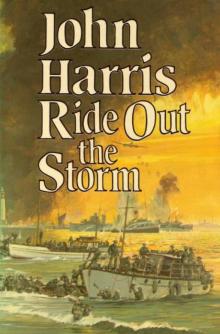 Ride Out The Storm
Ride Out The Storm Corporal Cotton's Little War
Corporal Cotton's Little War Fox from His Lair
Fox from His Lair Paint The Rainbow
Paint The Rainbow Flawed Banner
Flawed Banner Covenant with Death
Covenant with Death So Far From God
So Far From God The Sea Shall Not Have Them
The Sea Shall Not Have Them The Cross of Lazzaro
The Cross of Lazzaro Smiling Willie and the Tiger
Smiling Willie and the Tiger Harkaway's Sixth Column
Harkaway's Sixth Column The Sleeping Mountain
The Sleeping Mountain The Claws of Mercy
The Claws of Mercy North Strike
North Strike Picture of Defeat
Picture of Defeat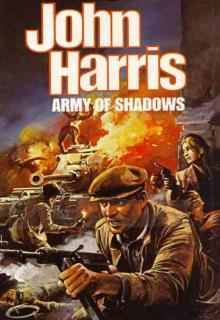 Army of Shadows
Army of Shadows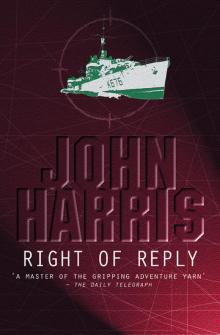 Right of Reply
Right of Reply Getaway
Getaway The Lonely Voyage
The Lonely Voyage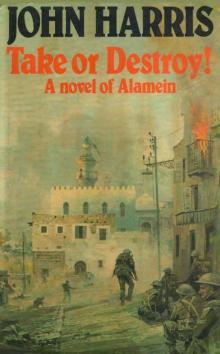 Take or Destroy!
Take or Destroy!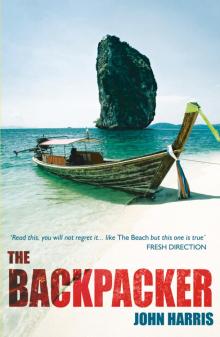 The Backpacker
The Backpacker A Funny Place to Hold a War
A Funny Place to Hold a War Swordpoint (2011)
Swordpoint (2011) A Kind of Courage
A Kind of Courage